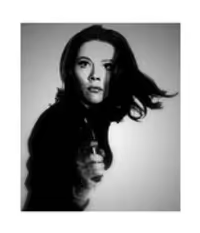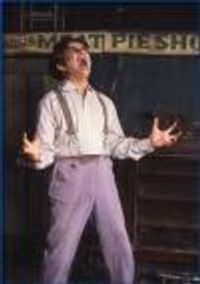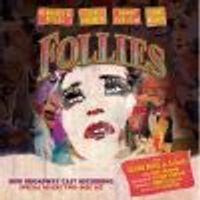How did Lotte Lenya win a Tony?
#1How did Lotte Lenya win a Tony?
Posted: 4/7/14 at 9:44pmI love her recording as Jenny in The Threepenny Opera. How did she win a Tony for an off-Broadway performance?
#2How did Lotte Lenya win a Tony?
Posted: 4/7/14 at 9:54pmIt is an interesting anomaly. She won in a competitive category, but the revival itself was given a special Tony for a distinguished off-Broadway production. Would love to know more about how this happened.
#3How did Lotte Lenya win a Tony?
Posted: 4/7/14 at 10:25pm
OK rephrasing this JUST for Roxy-
How did Lotte Lenya become eligible for the Antoinette Perry Award for Excellence in the BROADWAY theatre in an OFF Broadway show?
#5How did Lotte Lenya win a Tony?
Posted: 4/7/14 at 10:28pmIt transferred to Broadway from Off-Broadway.
Ed_Mottershead
Broadway Legend Joined: 10/20/05
#7How did Lotte Lenya win a Tony?
Posted: 4/7/14 at 11:56pm
As I recall, the rules were a little more relaxed at the time and the distinction between Broadway and Off-Broadway was not as pronounced. Yes, it received an award for Best Off-Broadway production, but the Tony's haven't been particularly consistent in the past as to who qualifies for what. Anyway, I don't think anyone minded too much that Lenya won the award, considering her historical significance and excellence in the world of Kurt Weill.
#8How did Lotte Lenya win a Tony?
Posted: 4/8/14 at 12:10am
The term "Off-Broadway" wasn't even coined until the early 1950s when 'fringe' theater was about to really peak in New York. At the time of Lenya's win, the Tony Awards did not yet differentiate Broadway from "Off Broadway" because THREEPENNY OPERA was in fact one of the shows that actually defined what "Off Broadway" was...
Here is a clip of Lenya performing "Pirate Jenny" from THREEPENNY in the early 1960s. She was fascinating.
https://www.youtube.com/watch?v=aFP3x4bKpZE
Updated On: 4/8/14 at 12:10 AM
#9How did Lotte Lenya win a Tony?
Posted: 4/8/14 at 6:12am
Huh. Interesting. I never knew/realized any of that about Off B'way or the Tonys.
Thanks for the info, all.
After Eight
Broadway Legend Joined: 6/5/09
#10How did Lotte Lenya win a Tony?
Posted: 4/8/14 at 7:35am
Michael Bennett,
Many thanks for this clip. What a magnetic, one-of-a-kind performer. People bandy about the word "brilliant" so readily nowadays; here is someone who deserves it, and then some.
"At the time of Lenya's win, the Tony Awards did not yet differentiate Broadway from "Off Broadway" because THREEPENNY OPERA was in fact one of the shows that actually defined what "Off Broadway" was... "
Since Threepenny Opera won a Tony for distingushed off-Broadway production, the awards did differentiate between the two; they just deemed off-Broadway shows (or was it solely this show that year?) eligible for Tony Award consideration.
#11How did Lotte Lenya win a Tony?
Posted: 4/8/14 at 7:44amAfter Eight, it appears to me that it was just for that show in that year or, if it wasn't, that the Tonys never considered any other Off-Broadway performance worthy of even a nomination.
Rinaldo
Understudy Joined: 5/5/09
#12How did Lotte Lenya win a Tony?
Posted: 4/8/14 at 8:37am
Sometimes things happen before anyone has prepared for them. A more recent example is revivals of older plays winning the Tony as a "new' play -- until the rules were redefined to deal with that.
Similarly when off-Broadway was a new thing (and it really was in the 1950s -- revivals of Shakespeare, Williams, O'Neill, "shocking" plays about drugs etc., the occasional weird musical... none of them candidates for a transfer to Broadway), nobody had imagined that the Tony awards needed to be "protected" against oddball activity elsewhere. So Lenya won her award, they realized this could be happening more and more, and rules were defined.
#13How did Lotte Lenya win a Tony?
Posted: 4/8/14 at 9:13amThe Tony Award rules as they're known today didn't become formalized until 1967 after the first telecast. The telecast brought in a large number of national viewers and the Broadway League began to strictly enforce who and what was eligible to favor its own product. There were arguments over eligibility before 1967, but the first telecast is the turning point for how the award eligibility is currently figured.
#14How did Lotte Lenya win a Tony?
Posted: 4/8/14 at 10:48am
I always felt like THE THREEPENNY OPERA symbolized the "arrival" of Off-Broadway - at least in some kind of formal capacity as an avenue for viable commercial theater production.
Awarding the production a special "Off-Broadway" Tony Award seems like a sort of official acknowledgement of that - though perhaps the Tony Awards administrators, at the time, also quickly realized the logistical challenges that would arise in regularly nominating and awarding Off Broadway productions, and quickly disbanded the category.
#15How did Lotte Lenya win a Tony?
Posted: 4/8/14 at 1:35pm(And, while by no means official, confusingly the Threepenny production talked about here is the only off-Broadway production that seems to have a listing on ibdb.com, although its lortel archive-off-Broadway database listing is more complete.)
#17How did Lotte Lenya win a Tony?
Posted: 4/8/14 at 2:35pm
Lotte Lenya was apparenly in the studio when Louis Armstrong recorded his version of "Mack the knife" and added her name to the lyrics. It has always seemed strange that Bobby Darin and many others have continued to keep her name in the lyrics of the song.
As did Eartha Kitt and even recently Michael Buble.
Can't find another reference to someone's name being added as a lyric as an off hand remark and becoming part of the "standard" lyric.
I wondered if Ella Fitzgerald was making reference to this when she added these lyrics to her version:
Oh bobby darin, and louis armstrong
They made a record, oh but they did
And now ella, ella, and her fellas
We're making a wreck, what a wreck
Of mack the knife
#18How did Lotte Lenya win a Tony?
Posted: 4/8/14 at 2:57pm
No. When Ella says "fellas" she's referring to the combo playing with her not to Bobby Darin and Louis Armstrong.
Ella frequently would insert phrases into scat sections of songs acknowledging that she was playing with the original melody and lyrics. She sang "making a wreck" in this song because, in her famous 1961 Berlin concert, she actually forgot the lyrics and sang something like this--never dropping the melody but making up the words as she went along. For the rest of her career, audiences demanded that she sing the improvised version:
Oh, what's the next chorus, to this song, now?
This is the one, now, I don't know,
But it was a swinging tune--and it's a hit tune--
So we tried to do Mack the Knife.
And Louis Miller...oh...something about CASH!
Yeah, Miller...he was spinning that trash.
And Macheath, dear, he spends like a sailor
Tell me, tell me, tell me could that boy do something rash?
Bobby Darin and Louis Armstrong
They made a record--oh, but they did!
And now Ella, Ella and her fellas
We're making a wreck--what a wreck!--of Mack the Knife.
Oh Sookie Tawdry...
[Scats]
Just a jack knife has Macheath, dear
[Scats]
So, you've heard it! Yes, we've swung it!
And we tried to...yes, we sung it!
You won't recognize it--it's a surprise hit!
This tune called Mack the Knife
And so we leave you, in Berlin town,
Yes, we've swung old Mack,
We've swung old Mack in town!
For the Darin fans and for the Louis Armstrong fans too,
We told you look out, look out, look out old Mackie is back in town!
#19How did Lotte Lenya win a Tony?
Posted: 4/8/14 at 3:00pm
Here's Lenya with Louis Armstrong at the recording session.

#20How did Lotte Lenya win a Tony?
Posted: 4/8/14 at 3:01pmLotte Lenya's talent was so incredible that it transcended the boundaries of Broadway and Off-Broadway that the Tony Committee had no other choice BUT to give her the award.
After Eight
Broadway Legend Joined: 6/5/09
#21How did Lotte Lenya win a Tony?
Posted: 4/8/14 at 6:05pm
"I always felt like THE THREEPENNY OPERA symbolized the "arrival" of Off-Broadway - at least in some kind of formal capacity as an avenue for viable commercial theater production. "
It is often said that the Jose Quintero revival of Summer and Smoke with Geraldine Page in 1952 was the production that put off-Broadway on the map. Actually, Eugene O'Neill had successful plays done in Greenwich Village some thirty years previously.
I don't know when the term off-Broadway was first used as a general concept, but I note that the Theatre World annual lists plays under that rubric in its very first volume, the 1944-45 season.
"the Threepenny production talked about here is the only off-Broadway production that seems to have a listing on ibdb.com, although its lortel archive-off-Broadway database listing is more complete.)"
Off-Broadway plays from the 20's and 30's at the Provincetown Playhouse and Cherry Lane Theatre are also listed in the IBDB.
Updated On: 4/8/14 at 06:05 PM
#22How did Lotte Lenya win a Tony?
Posted: 4/9/14 at 10:34am
Thanks PalJoey, I know she was making reference to herself and her band, but I thought the inference of wrecking the song not only applied to her but to Darin and Armstrong as well.
If she were just poking fun at herself, I don't know why she would reference Darin and Armstrong. And up to that point she hadn't changed the lyrics. So, I guessed she was giving a nod to them for going off script when she did in a very conscious way.
There are many folk songs that seem to invite wide discretion in adding/deleting lyrics, Stagger Lee being one of the most malleable. But, Mack the Knife, seems to be the "standard" that people feel free to augment.
Updated On: 4/9/14 at 10:34 AM
Videos



.jpg?format=auto&width=200)








